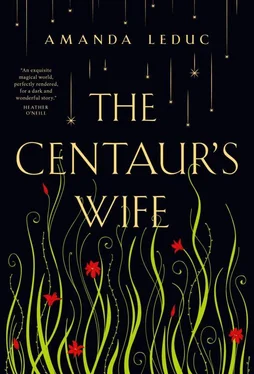“Give me Greta,” B snaps, from behind her. “Give her to me now.”
When she hands him the baby, his face softens right away. “There’s a TV in the living room,” he says. “No signal there either.” She can hear the faint scratch of static and is surprised there’s power at all. Others are filtering out into the backyard and come to stand beside them.
What happens now? she sees everyone thinking. What happens now?
The ones on the mountain—she knows they’re there—see them too. They stand untouched, their marble arms and glossy flanks just as she remembered from that day on the mountain when she was a child, while Heather and B stand with the girls, their lives flecked with ruin.
No one goes up on the mountain now. She’s the reason why.
She’d been a strange child. Dark-haired and quiet, her limp sometimes imperceptible and other times visible from halfway down the street. She had a crutch when she was tiny but then, when she was a little older, only her own unsteady feet. Her mother worried about shoes and braces; her father said it didn’t matter.
“No one else walks like you, Heather-Feather,” he would say to her. “That’s something to be proud of.”
When she was a baby, her family had moved from their house under the mountain’s shadow to a house in the city proper—at the end of the last street before the mountain fields. A house that backed onto thick forest.
“We’ve moved for her. We need to be close to good schools,” her mother always said, though Heather knew it was for her mother too.
The mountain made her mother nervous in a way she couldn’t explain. So instead she focused on the things that she could know: how far away the schools were, how long it would take Heather to walk there.
“I don’t want her to have to walk too far,” her mother said. “I don’t want her to get tired.”
“Heather’s a trooper,” her father had said. She’d been born two months early; they hadn’t been sure she’d survive. “The more she walks, the stronger she’ll get.”
“I know that, ” her mother said. “But what will the children at school think?”
The children at school thought she walked funny, and told her so. They imitated her when they thought she wasn’t looking—the uneven circle of her hips, the slow swing of her leg. They laughed.
School became another place for her to practise being alone. The stories she told herself on the playground were like the stories her father told her at night before bed; the stepsisters who cut off their toes so that they could wear the glass slipper, Hansel and Gretel with no happy ending.
“The witch has a crutch,” she said to her father. “Like the one I used to have.”
“But you don’t need the crutch anymore,” he told her. “And the witch was only pretending.” Then he told her about the mermaid who drowned herself in the sea.
“Stop telling her those stories,” her mother would say. Her mother, who had fallen in love with a dark-haired boy who worked outside and sang to trees. They were older now, with bills and a house and a child. No more romantic nights beneath the stars for them. Most days she felt foolish when she remembered who they used to be.
In the city, it was easier for Heather’s mother to pretend that Heather’s father was merely eccentric. He might go for long walks at night; he might go closer to the mountain than anyone was supposed to go. His whole family had been like that—dreamers, fantasists, people who told you a good story but forgot to put food on the table. In the city this could all be kept secret; that was the point of being city dwellers now, not outcasts who lived in a strange house under the mountain. He could tend the municipal gardens. She could teach at the school.
“Stop telling her things that are sad, ” Heather’s mother would say. “Heaven knows she gets enough of that already.”
But Heather wasn’t sad; not really. The world was deep and dark and wonderful. Sometimes, like when she was at school, she did not like to be in it, and sometimes she did cry, but that was okay. Her father made it okay.
At night he went for long walks through the fields close to the mountain, sometimes for hours, always alone. He rarely slept. His fingernails were almost always black with dirt, but his hands were lovely—strong hands that tamed the flowers on the city boulevard as easily as they coaxed colour from the gardens at their house. He talked to the flowers and sometimes, he told Heather, they talked back. It had been so long since he’d been unhappy that Heather forgot that he’d ever been sad.
It was good, the doctors told her mother, to indulge him from time to time. If he was happy, let him be happy. Let him believe stories were true.
“One day you’ll come walk with me too,” he told Heather when she was ten. “We just need to wait until you’re a little older, Heather-Feather, and a little stronger. That’s all.”
She grew; her legs grew too, though her right leg remained shorter than the left. She was not able to do all of the things that the other kids could do—she couldn’t run as fast, she was a tentative climber—but to keep him hoping, she told her father stories of the games they played at school, the hikes the kids took in the city parks. I came in third in the race in gym today.
She kept the stories that he told her close, and thought about him walking far and wide under the moon. Once upon a time there were twelve princesses who danced late into the night. Once upon a time there were foxes who could talk, and witches who lived in the woods and granted wishes if you were brave enough to find them. They were only stories, yes, but wasn’t it nice to imagine a world that had so much dancing? Wasn’t it nice to imagine a world where mermaids were real, where she might win a race, where maybe one day it wouldn’t be difficult to walk a straight line?
Sometimes, if she was lucky, her father took her out into the city parks at night, and together they counted the stars. Three billion, one hundred and twenty-six million, four hundred and twenty-five thousand and one. They were like snowflakes, he told her. No two were the same. She carried the words inside her heart.
Then he died, and she didn’t have words anymore.
The survivors gather in another of the nearby houses, closer to the wreckage of the hospital. This one is larger, and there are no burned bodies in the backyard. They shuffle in and collapse on the couches, on the floor. Someone picks up the cordless phone beside the couch and dials 911 and nothing happens. There is no dial tone.
“So the TV stations and the cell towers are out. It can’t be everything. Can it?” a young girl says. Eighteen, maybe nineteen, something like that. Her hair is white-blonde and choppy, her Doc Martens boots just like the ones Heather wore as a teen.
“If the stations are out,” Heather says, “it’s because the satellites are out.”
“Maybe it was just our stations, though. Our satellites. Maybe other cities are okay?”
“If our own satellites are out,” Heather says, gently, “this isn’t the only place where this has happened.” She watches the man standing beside B take all of this in. Watches him remember that yes, there are other places, there’s an entire rest of the world. Surely the rest of the world is okay. Surely this was just us—one catastrophe, contained.
She closes her eyes and sees the large crater, looks down inside, sees the hunk of rock that’s even now cooling and fusing hard to the dirt. The pictures in her mind tumble fast—fiery rocks in other cities, in the oceans, across the continent.
Читать дальше













